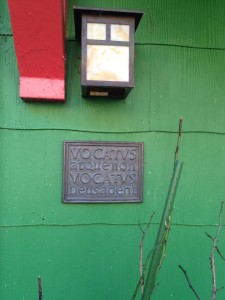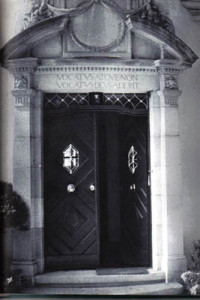One of the problems facing anyone trying to discuss much of anything about education is the question of just what education is. As I have suggested elsewhere, while I have a very clear idea of what education is, your very clear vision may be different, and we have yet to even get to those who have little or no vision. But how, I have been pondering, might someone explain what education might mean to someone who might not have been the beneficiary of an education? And it was at that point that I had a delightful bit of travel (without ever leaving my seat) that seemed, in part, to answer that very question. And I thought I would share that with you.

Snapshot by Elstun Lauesen
We start in Juneau, exploring Star Hill, and there come across an oddly painted building with an even odder plaque. It states (in antiquish uncial-like font),
vocatus atque non vocatus deus aderit
which translates in Latin to, “Called or not called, God will be there.” What is the source of this curious statement? It turns out that this text is copied from a famous doorway in Kusnacht, Switzerland. Carl Jung, the 20th Century psychologist, had the Latin carved in to the stone above the door of his house in Kusnacht.
“By the way, you seek the enigmatic oracle Vocatus atque non vocatus deus aderit in vain in Delphi: it is cut in stone over the door of my house in Kusnacht near Zurich and otherwise found in Erasmus’s collection of Adagia (XVIth cent.). [Jung had acquired a copy of the 1563 edition of Erasmus’s Collectaneas adagiorum, a compilation of analects from classical authors, when he was 19 years old.] It is a Delphic oracle though. It says: yes, the god will be on the spot, but in what form and to what purpose? I have put the inscription there to remind my patients and myself: Timor dei initium sapiente [“The fear of the Lord is the beginning of wisdom.”] Here another not less important road begins, not the approach to “Christianity” but to God himself and this seems to be the ultimate question.” (1975: 611) From http://www.jungnewyork.com/photo_vocatus.shtml, and see also http://www.thezodiac.com/called.htm
And we are off to 16th century Rotterdam to look into the Adagio of Erasmus. The “proverb” and anecdote that struck Jung can be seen here (though the edition is not the same. ) As Aniela Jaffe notes, “It is the answer the Delphic Oracle gave the Lacedemonians when they were planning a war against Athens” (1979: 136) confirming that the God will be with the Lacedemonians. And, it quotes the Odes of Quintus Horatius Flaccus (Horace) so off to Imperial Rome we go. And there we find Horace telling us in Book 2, Ode 18:
Proud Tantalus, and Pelops,
his son, he holds fast, and whether he’s summoned,
or whether he’s not, he lends
an ear, and frees the poor man, his labours done.
But what has this to do with the Oracle? It would seem that Horace was offering a play on the words of the Oracle! Off to Thucydides’ Greece to chat with the Oracle? Well perhaps by way of 21st Century Boston, where we catch up with J. Kates, who clarifies all in a humorous though cautionary tale well worth the reading (and the trip!)
The panel on that doorway is just another ironic cast (yes, it is a bad pun, but I am going to continue to use it…) The plaque of course is not iron, but what is ironic is that anyone, having read Horace’s Ode condemning vain riches, would be so clueless as to carve the source of Horace’s skewering on their lintel, let let alone nail it in in brass (now that is ironic) to their door.
“Does any of this have anything to do with education?”, you might well inquire. My point in traipsing through time and space was to demonstrate that as a direct result of my education I undertook that journey. An “explore” is a lifelong journey, teaming curiosity with discipline, which enriches each life so engaged, and those touching them.
Unique experience? I think not. Recently the careful consideration of a Bosch painting produced this rendered transcription and this Buttiful Music (details here and here .)
__

bravo. Our lives, as Jung observed, are a complexio oppositorum filled with delights for the ironic palate.
[…] of the Socratic pedant; a question posed to facilitate the journey (much as the uninvited guest becomes the journey’s host here.) The leap, known to Sojourners in the East as the ‘koan’, is intended neither as the […]